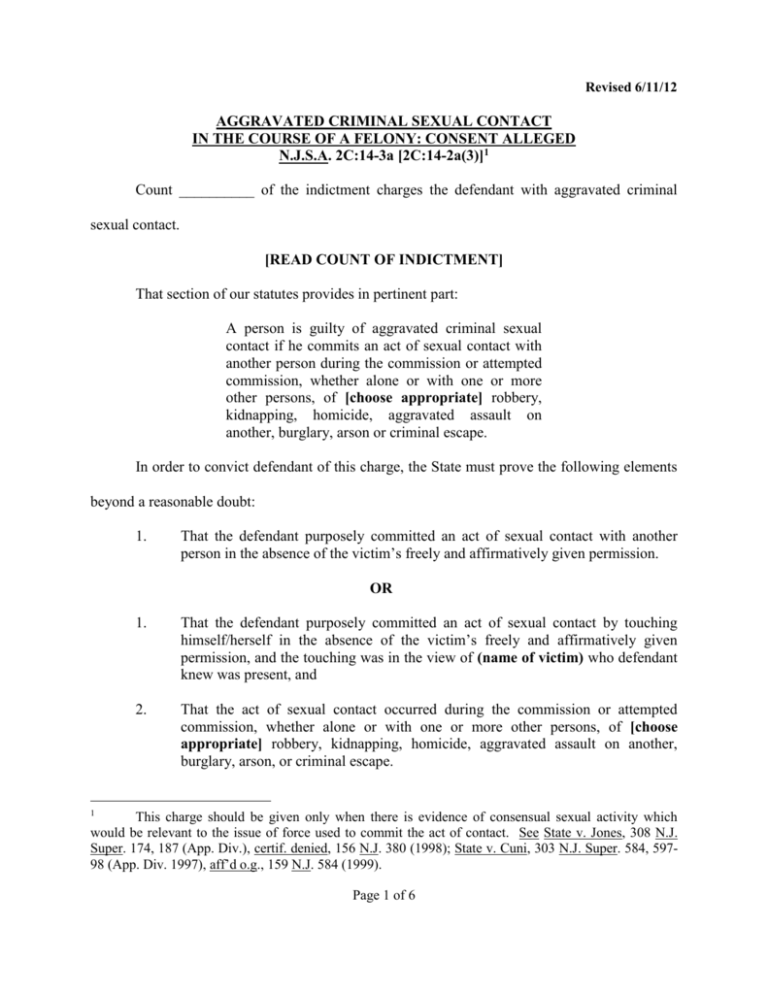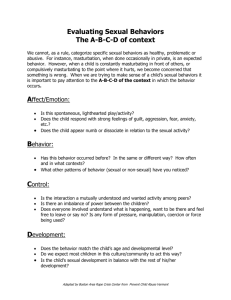
Revised 6/11/12
AGGRAVATED CRIMINAL SEXUAL CONTACT
IN THE COURSE OF A FELONY: CONSENT ALLEGED
N.J.S.A. 2C:14-3a [2C:14-2a(3)]1
Count __________ of the indictment charges the defendant with aggravated criminal
sexual contact.
[READ COUNT OF INDICTMENT]
That section of our statutes provides in pertinent part:
A person is guilty of aggravated criminal sexual
contact if he commits an act of sexual contact with
another person during the commission or attempted
commission, whether alone or with one or more
other persons, of [choose appropriate] robbery,
kidnapping, homicide, aggravated assault on
another, burglary, arson or criminal escape.
In order to convict defendant of this charge, the State must prove the following elements
beyond a reasonable doubt:
1.
That the defendant purposely committed an act of sexual contact with another
person in the absence of the victim’s freely and affirmatively given permission.
OR
1.
That the defendant purposely committed an act of sexual contact by touching
himself/herself in the absence of the victim’s freely and affirmatively given
permission, and the touching was in the view of (name of victim) who defendant
knew was present, and
2.
That the act of sexual contact occurred during the commission or attempted
commission, whether alone or with one or more other persons, of [choose
appropriate] robbery, kidnapping, homicide, aggravated assault on another,
burglary, arson, or criminal escape.
1
This charge should be given only when there is evidence of consensual sexual activity which
would be relevant to the issue of force used to commit the act of contact. See State v. Jones, 308 N.J.
Super. 174, 187 (App. Div.), certif. denied, 156 N.J. 380 (1998); State v. Cuni, 303 N.J. Super. 584, 59798 (App. Div. 1997), aff’d o.g., 159 N.J. 584 (1999).
Page 1 of 6
AGGRAVATED CRIMINAL SEXUAL CONTACT IN
THE COURSE OF A FELONY: CONSENT ALLEGED
N.J.S.A. 2C:14-3a [2C:14-2a(3)]
The first element that the State must prove beyond a reasonable doubt is that defendant
committed an act of sexual contact upon (name of victim). Sexual contact means an intentional
touching by (name of victim) or by the defendant, either directly or through clothing, of (name
of victim’s) or defendant's intimate parts for the purpose of degrading or humiliating (name of
victim) or sexually arousing or gratifying defendant.
Intimate parts means [CHOOSE APPROPRIATE] sexual organs, genital area, anal
area, inner thigh, groin, buttock or breast of a person.
To find that defendant committed an act of criminal sexual contact, you must find beyond
a reasonable doubt both that the touching was intentional and that it was done with the purpose
of degrading or humiliating (name of victim) or sexually arousing or gratifying the defendant.
Intentional means purposeful. A person acts purposely with respect to the nature of
his/her conduct or a result thereof if it is his/her conscious object to engage in conduct of that
nature or to cause such a result.
A person acts purposely with respect to the attendant
circumstances if he/she is aware of the existence of such circumstances or believes or hopes that
they exist.
[WHEN DEFENDANT IS CHARGED WITH TOUCHING HIMSELF/HERSELF,
ADD THE FOLLOWING: The State must prove beyond a reasonable doubt that the touching
was in view of the victim whom the defendant knew to be present.2 The State is not required to
prove that (name of victim) actually observed or witnessed the alleged sexual contact. Rather,
the State must prove that the alleged sexual contact occurred in the view of (name of victim).
2
State v. Zeidell, 154 N.J. 417 (1998).
Page 2 of 6
AGGRAVATED CRIMINAL SEXUAL CONTACT IN
THE COURSE OF A FELONY: CONSENT ALLEGED
N.J.S.A. 2C:14-3a [2C:14-2a(3)]
“Field of vision” is not limited to the visual direction in which the alleged victim is focused upon
at the particular time when the alleged sexual contact is said to have occurred. Field of vision
includes the areas that (name of victim) was capable of viewing.3 The State must prove beyond
a reasonable doubt that (name of victim) was present.
A person acts knowingly with respect to the nature of his conduct or the attendant
circumstances if he/she is aware that the conduct is of that nature or that such circumstances exist
or the person is aware of a high probability of their existence. A person acts knowingly with
respect to a result of the conduct if he/she is aware that it is practically certain that the conduct
will cause such a result. “Knowing,” “with knowledge,” or equivalent terms have the same
meaning.]
Purpose [and knowledge] [is] [are] [a] condition[s] of the mind. [It] [They] cannot be
seen. Often, [it] [they] can only be determined by inference from defendant’s conduct, words or
acts. A state of mind is rarely susceptible of direct proof but must ordinarily be inferred from the
facts. Therefore, it is not necessary that the State produce witnesses to testify that an accused
said that he/she had a certain state of mind when he/she did a particular thing. It is within your
power to find that such proof has been furnished beyond a reasonable doubt by inference which
may arise from the nature of his/her acts and conduct and from all he/she said and did at the
particular time and place and from all surrounding circumstances established by the evidence.4
The State must further prove beyond a reasonable doubt that defendant committed the act
3
State v. Breitweiser, 373 N.J. Super. 271, 276, 286-87 (App. Div. 2004).
The underlying offense(s) charged, e.g., robbery, kidnapping, homicide, burglary, may feature
different states of mind. In that case, the court should include those states of mind in this portion of the
charge.
Page 3 of 6
4
AGGRAVATED CRIMINAL SEXUAL CONTACT IN
THE COURSE OF A FELONY: CONSENT ALLEGED
N.J.S.A. 2C:14-3a [2C:14-2a(3)]
of sexual contact without the victim’s freely and affirmatively given permission to the specific
act of contact alleged to have occurred.5
The State alleges that (describe sexual contact
alleged). You must decide whether the defendant’s alleged act of sexual contact was undertaken
in circumstances that led the defendant reasonably to believe that the victim had freely given
affirmative permission to the specific act of sexual contact. Simply put, affirmatively given
permission means the victim did or said something which would lead a reasonable person to
believe (he/she) was agreeing to engage in the act of sexual contact, and freely given permission
means the victim agreed of (his/her) own free will to engage in the act of sexual contact. Freely
and affirmatively given permission can be indicated either through words or through actions that,
when viewed in light of all the surrounding circumstances, would demonstrate to a reasonable
person that affirmative and freely given permission for the specific act of sexual contact had
been given.
Persons need not, of course, expressly announce their consent to engage in an act of
sexual contact for there to be affirmative permission. Permission to engage in an act of sexual
contact can be and indeed often is indicated through physical actions rather than words.
Permission is demonstrated when the evidence, in whatever form, is sufficient to demonstrate
that a reasonable person would have believed that the alleged victim had affirmatively and freely
given authorization to the act.
Proof that the act of sexual contact occurred without the victim’s permission can be based
on evidence of conduct or words in light of surrounding circumstances, and must demonstrate
5
State in the Interest of M.T.S., 129 N.J. 422 (1992).
Page 4 of 6
AGGRAVATED CRIMINAL SEXUAL CONTACT IN
THE COURSE OF A FELONY: CONSENT ALLEGED
N.J.S.A. 2C:14-3a [2C:14-2a(3)]
beyond a reasonable doubt that a reasonable person would not have believed that there was
affirmative and freely given permission. If there is evidence to suggest that the defendant
reasonably believed that such permission had been given, the State must demonstrate either that
the defendant did not actually believe that such permission had been freely given, or that such a
belief was unreasonable under all of the circumstances.
In determining the reasonableness of defendant’s belief that the victim had freely given
affirmative permission, you must keep in mind that the law places no burden on the alleged
victim to have expressed non-consent or to have denied permission.
[CHARGE IF APPROPRIATE]
You should not speculate as to what the alleged victim thought or desired or why (he/she)
did not resist or protest. The State is not required to prove that the victim resisted, or resisted to
the utmost or reasonably resisted the sexual contact.
[CHARGE IN ALL CASES]
The second element that the State must prove beyond a reasonable doubt is that the
sexual contact occurred during the commission or attempted commission, whether alone or with
one or more other persons, of [choose appropriate] robbery, kidnapping, homicide, aggravated
assault on another,6 burglary, arson, or criminal escape. [Instruct the jury on the elements of
the appropriate crime or attempted crime or, if already charged, remind jurors of previous
6
Note that under this statute aggravated assault on another refers to a situation in which an aggravated
assault is committed or attempted upon a third person (not the victim) to compel a victim to submit to an
aggravated criminal sexual contact. State v. Rangel, 422 N.J. Super. 1 (App. Div. 2011), certif. granted,
209 N.J. 233 (2012). Where appropriate, the jury should be so charged.
Page 5 of 6
AGGRAVATED CRIMINAL SEXUAL CONTACT IN
THE COURSE OF A FELONY: CONSENT ALLEGED
N.J.S.A. 2C:14-3a [2C:14-2a(3)]
instructions.]7
If you find that the State has proven every element beyond a reasonable doubt, then you
must find the defendant guilty of aggravated criminal sexual contact. If you find that the State
has failed to prove any of these elements beyond a reasonable doubt, then you must find the
defendant not guilty of aggravated criminal sexual contact.
7
If the court intends to instruct the jury on lesser offenses of these felonies, it should advise the
jury that convictions on these lesser offenses will not support a conviction of aggravated criminal sexual
contact in the course of an enumerated felony. For example, if defendant were charged with aggravated
criminal sexual contact in the course of a burglary and the jury convicted defendant of the lesser offense
of trespass, that would not support a conviction of aggravated criminal sexual contact in the course of a
felony. Cf. State v. Gray, 147 N.J. 4, 15 (1996) (defendant’s felony murder conviction reversed because
the underlying felony found by the jury was conspiracy to commit arson, which is not one of the
enumerated felonies in the statute).
Page 6 of 6








